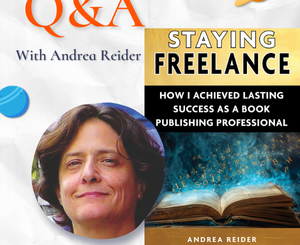Why and How You Should Write and Publish Short Fiction by Laurel Osterkamp
 Let’s welcome back Laurel Osterkamp as she shares with us “Why and How You Should Write and Publish Short Fiction.” Enjoy!
Let’s welcome back Laurel Osterkamp as she shares with us “Why and How You Should Write and Publish Short Fiction.” Enjoy!
***
If you write novels, I bet you can connect with poor old Sisyphus, who Zeus punished in the underworld by forcing him to roll a boulder up a hill for eternity. Every time Sisyphus almost reached the top of the hill, the boulder rolled back down.
Isn’t that a lot like publishing?
Maybe you’re lucky and/or extremely talented, and you’ve procured a lucrative publishing deal. Or, you’ve self-published and figured out how to beat Amazon’s algorithms and have sold tons of copies all on your own.
But if you’re like me, you’ve flirted with success but haven’t quite gotten that boulder to the top of the mountain.
However, it doesn’t have to be all or nothing.
There are many ways to grab a foothold on your way up that publishing hill, and experience small victories. One of them is by writing and publishing short fiction in online literary journals.
Reasons to Write and Publish Short Fiction
Writing and publishing short fiction can be a great way to both hone your craft and reach a new audience.
There’s a sizable market for both flash fiction (usually 1500 words or fewer) and short stories (usually 1500 to 7500 words.)
Writing short fiction provides a great opportunity to explore different characters, settings, and storylines, and to have a lot of creative freedom and control over your story that you may not have with a novel.
In addition, publishing short stories can also be a great way to gain exposure and reach a wider audience. Unlike novels, which can often take years to write and publish, short stories can be written and published in a matter of months.
This gives you the opportunity to get your stories out into the world quickly and start building a fan base.
If you’re looking for an agent or a contract with a traditional publisher, having a list of published short fiction is a great feather in your cap.
Agents and publishers are often on the lookout for fresh, new voices in literary fiction, and a well-crafted short story can be a great way to get your work in front of them. Or, if you’re writing a press release and/or promoting your latest novel, having a list of publishing credits will help you get noticed.
Finally, writing and publishing short stories can be a great way to stay motivated and build confidence in your writing. I’m not saying it’s easy to get a piece published, but when it happens, it’s definitely a rush.
How to Publish Short Fiction
If you’re serious about writing and publishing short fiction, I strongly suggest using the submission manager Duotrope. I’ve found multiple homes for my short fiction through them.
How to Come up with Ideas for Short Fiction
But how do you come up with ideas for short fiction in the first place?
Admittedly, the possibilities are endless.
With so many different types of stories out there, it can be difficult to know where to start.
Here are some tips to help you come up with fresh, engaging ideas for your next story.
- Let your mind wander.
I often come up with my best ideas while I’m on my morning run, or when I’m in the shower. Some of my writer friends wake from dreams with their best ideas. I suggest having paper and a pen handy for when you’re able to make notes, so you don’t forget!
- Look at current events.
Staying up to date with what’s going on in the world can give you plenty of fodder for story ideas. I got the idea for “That Damn Selfie” (published by The MetaWorker) by watching a true crime show, and it’s one of my favorite stories.
- Use writing prompts.
If you’re struggling to come up with ideas, using writing prompts can be a great way to kick-start your creativity. This online writing prompt generator is free and a lot of fun.
- Keep a journal.
Keeping a journal is a great way to capture ideas as they come to you. It doesn’t have to be anything fancy, just jot down the ideas you have so you don’t forget them. You never know when an idea you wrote down months ago might spark something new.
- Read a lot.
Reading is one of the best ways to come up with new ideas. Not only will it give you insight into different genres and styles, but it will also help you to hone your craft.
As you read, pay attention to the different techniques authors use to draw readers in, and try to emulate those techniques in your own work.
My all-time favorite piece, (“You and Jane,” recently published by Abandon Journal) was inspired by Jane Eyre. But the absurdist style of the piece was also influenced by Donald Barthelme’s “The School.”
These are just a few tips to help you come up with ideas for your fiction stories.
Don’t be afraid to be creative and take risks–sometimes the best stories come from the strangest of places.
So get out there, read, daydream, and start writing.
Before you know it, you’ll have a great story idea to share with the world. And perhaps you’ll feel like you’ve pushed that boulder up the mountain!
For a detailed list with links and explanations of my short fiction publishing journey, visit Published Short Fiction – LaurelLit.com
***
About the Author
Laurel Osterkamp is from Minneapolis, where she teaches and writes like it’s going out of style. Her short fiction has been featured in Tangled Locks Literary Journal, Bright Flash Literary Journal, and Metawoker Lit, among other places. Her latest novel Favorite Daughters was recently released by Black Rose Writing. (Click here to see the novel on Amazon.)
Social Media:
Website – https://laurellit.com
Facebook – https://www.facebook.com/authorlaurelosterkamp
BookBub – https://www.bookbub.com/profile/laurel-osterkamp







